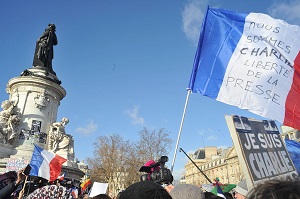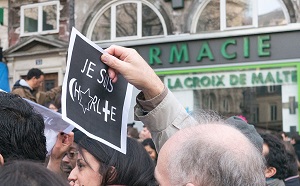PARIS — On Friday, after prayers at the Grand Mosque here, the faithful emerged holding banners saying, against the background of the French flag, “Touche pas à mon pays,” or “Hands off my country” — echoing the slogan of the French anti-discrimination association SOS Racisme: “Touche pas à mon pote,” or “Hands off my buddy.” Other signs proclaimed that the terrorists who killed the journalists at Charlie Hebdo and the customers of a kosher supermarket last week were not true Muslims — as the family of Ahmed Merabet, the Muslim police officer who was killed trying to protect Charlie Hebdo, has poignantly noted.
Most Muslims in France feel completely French, and want the majority of French society to accept them as such. But no matter how categorically they reject terrorism committed in the name of Islam, many French citizens still view them with suspicion, not entirely unjustly. For decades, Islamists have been hard at work in prisons, industrial suburbs and neighborhood mosques, peddling a strong religious identity and hope for the future to disaffected young people.
Islam has become more than a religion: To many French youths of immigrant origin, it now provides a culture that France itself has not managed to instill. For some, a desire for life has been replaced by a desire for death: the death of others, of infidels, and one’s own death as a martyr bound for paradise. That is how Al Qaeda and now the Islamic State have recruited volunteers to train in Iraq, Yemen, Pakistan or Libya.
The French government has not paid serious and sustained attention to the situation in its often dreary suburbs, a neglected zone where unsocialized youths live — or merely survive. Islamist recruiters target this empty space, abandoned by the state. The increasingly racist language of the right-wing National Front, and a current of intellectual discourse that accuses immigrants and their children of blurring France’s national persona, have fostered resentment among young people whose Frenchness is always questioned, and never taken for granted.
The novelist Michel Houellebecq’s latest book, “Submission,” imagines a France governed in 2022 by a Muslim president who sends women back into the home and legalizes polygamy. A recent polemic, “The French Suicide,” by the journalist Éric Zemmour, ascribes the decline of France to the pernicious influence of the student uprisings in May 1968, immigration,same-sex marriage and feminism: ultraconservative and reactionary ideas that have made this book a huge best seller and that resemble those of the National Front (albeit unintentionally, according to Mr. Zemmour).
France has been bruised, traumatized, left reeling. The French are frightened — or more precisely, they are being frightened. The National Front has made fear its credo. It demonizes millions of immigrants as invaders who feast on welfare benefits while putting others out of work. Of course, this reasoning doesn’t hold up. As economists have pointed out, nations in the West ought to be more worried about their aging populationsthan about their immigrants. If a magic wand were to send all of France’s Muslim immigrants back where they came from, the nation would come to a halt economically.
France is thus torn between an ever-more-powerful extreme right (polls suggest that the National Front’s leader, Marine Le Pen, could prevail — if not outright, then in a runoff — in the 2017 presidential election) and its liberal traditions of asylum. The right wing demands closing borders and pulling back, while the left wing is determined to remain true to its humanist principles.
Changing the daily lives of French Muslims demands a new political vision, a real determination to confront the problems of the troubled suburbs, and an acknowledgment of the identity of French youths, who have been left to fend for themselves, victims of racism whenever they look for work or go out for an evening of fun. The authorities must deal with the recruiting activities of extremist imams and monitor their speeches. They have their work cut out for them in the prisons as well, now ideal venues for indoctrination that generates fodder for jihad. And lastly, a great effort must be made in the schools, where textbooks should be revised to reflect the diversity of French tradition, and new courses offered on racism and on the history of religions.
But it’s also up to Muslims to get organized and see to the education of adolescents — too many of whom are left to drift on their own and into the net of political Islamism, easy prey for jihadist recruiters. Some imams have promised to undertake this salvage operation, but it is a daunting task: In certain schools in the department of Seine-Saint-Denis, for example, some students of immigrant origin refused to observe a minute of silence last Thursday to honor the victims of the terrorist massacre.
However, the millions of people who marched in cities across France on Sunday, in a peaceful show of solidarity, are cause for hope. The false amalgam of Islam and murderous Islamism is coming apart. The great numbers of Muslim men and women in these demonstrations, carrying signs announcing “I am a Muslim, I am a Jew, I am Charlie,” have been widely noted.
The tragedy in France has had an astounding effect throughout the world. Will the country now, at last, throw a lifeline to a generation of young French citizens who have been adrift for want of nurturing culture and education, easily seduced by violent men who are not what they seem? President François Hollande appears strengthened by this ordeal, praised for his nobility and dignity. We will see if he can carry on Sunday’s legacy of liberté, égalité, fraternité.














































